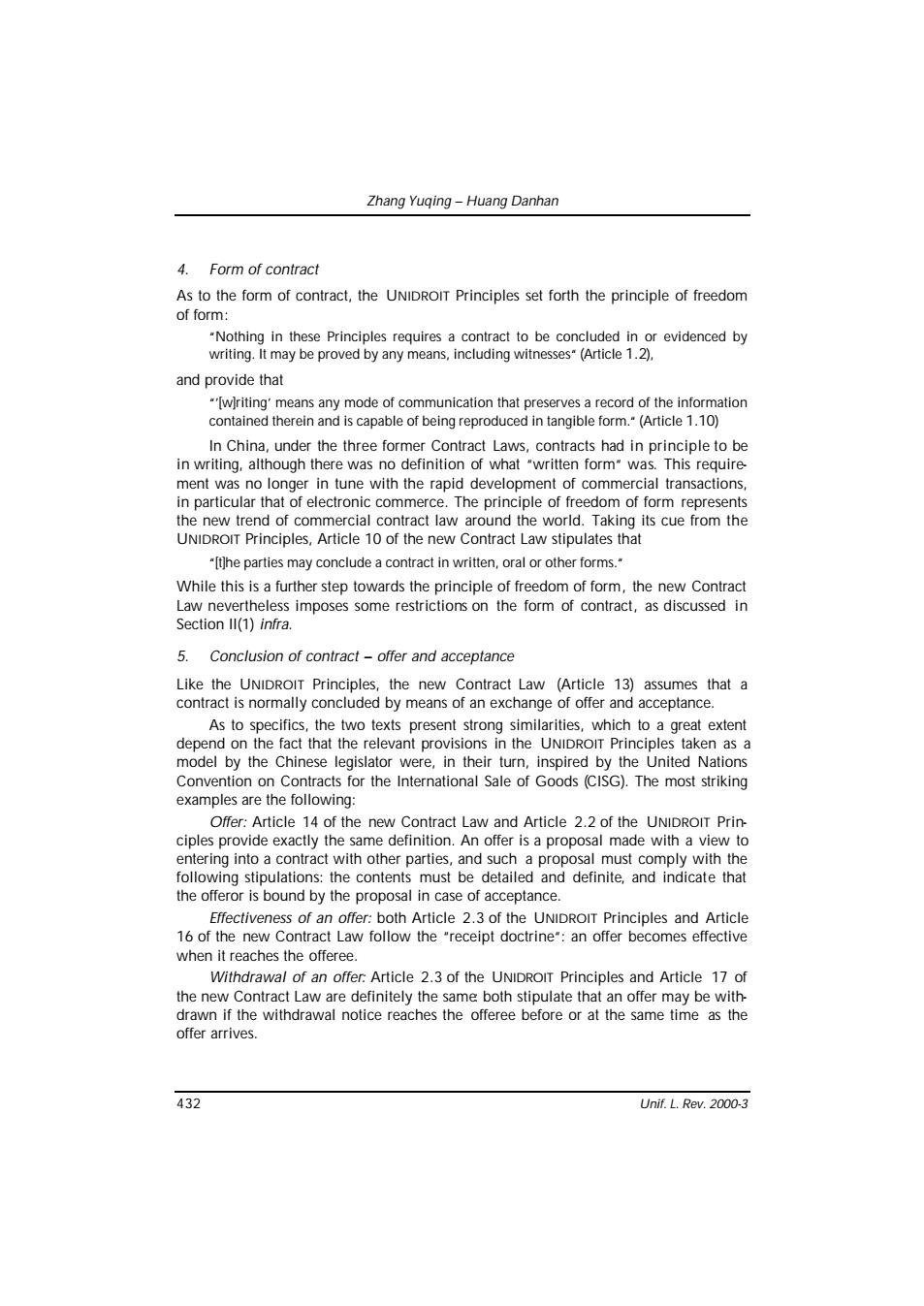正在加载图片...

Zhang Yuging-Huang Danhan 4.Form of contract As to the form of contract,the UNIDROIT Principles set forth the principle of freedom of form: "Nothing in these Principles requires a contract to be concluded in or evidenced by writing.It may be proved by any means,including witnesses"(Article 1.2). and provide that "[w]riting'means any mode of communication that preserves a record of the information contained therein and is capable of being reproduced in tangible form."(Article 1.10) In China,under the three former Contract Laws,contracts had in principle to be in writing,although there was no definition of what "written form"was.This require ment was no longer in tune with the rapid development of commercial transactions, in particular that of electronic commerce.The principle of freedom of form represents the new trend of commercial contract law around the world.Taking its cue from the UNIDROIT Principles,Article 10 of the new Contract Law stipulates that "[t]he parties may conclude a contract in written,oral or other forms." While this is a further step towards the principle of freedom of form,the new Contract Law nevertheless imposes some restrictions on the form of contract,as discussed in Section Il(1)infra 5. Conclusion of contract-offer and acceptance Like the UNIDROIT Principles,the new Contract Law (Article 13)assumes that a contract is normally concluded by means of an exchange of offer and acceptance. As to specifics,the two texts present strong similarities,which to a great extent depend on the fact that the relevant provisions in the UNIDROIT Principles taken as a model by the Chinese legislator were,in their turn,inspired by the United Nations Convention on Contracts for the International Sale of Goods (CISG).The most striking examples are the following: Offer:Article 14 of the new Contract Law and Article 2.2 of the UNIDROIT Prin- ciples provide exactly the same definition.An offer is a proposal made with a view to entering into a contract with other parties,and such a proposal must comply with the following stipulations:the contents must be detailed and definite,and indicate that the offeror is bound by the proposal in case of acceptance. Effectiveness of an offer:both Article 2.3 of the UNIDROIT Principles and Article 16 of the new Contract Law follow the "receipt doctrine":an offer becomes effective when it reaches the offeree. Withdrawal of an offer:Article 2.3 of the UNIDROIT Principles and Article 17 of the new Contract Law are definitely the same both stipulate that an offer may be with- drawn if the withdrawal notice reaches the offeree before or at the same time as the offer arrives. 432 Unif.L.Rev.2000-3Zhang Yuqing – Huang Danhan 432 Unif. L. Rev. 2000-3 4. Form of contract As to the form of contract, the UNIDROIT Principles set forth the principle of freedom of form: “Nothing in these Principles requires a contract to be concluded in or evidenced by writing. It may be proved by any means, including witnesses“ (Article 1.2), and provide that “’[w]riting’ means any mode of communication that preserves a record of the information contained therein and is capable of being reproduced in tangible form.“ (Article 1.10) In China, under the three former Contract Laws, contracts had in principle to be in writing, although there was no definition of what “written form“ was. This requirement was no longer in tune with the rapid development of commercial transactions, in particular that of electronic commerce. The principle of freedom of form represents the new trend of commercial contract law around the world. Taking its cue from the UNIDROIT Principles, Article 10 of the new Contract Law stipulates that “[t]he parties may conclude a contract in written, oral or other forms.“ While this is a further step towards the principle of freedom of form, the new Contract Law nevertheless imposes some restrictions on the form of contract, as discussed in Section II(1) infra. 5. Conclusion of contract – offer and acceptance Like the UNIDROIT Principles, the new Contract Law (Article 13) assumes that a contract is normally concluded by means of an exchange of offer and acceptance. As to specifics, the two texts present strong similarities, which to a great extent depend on the fact that the relevant provisions in the UNIDROIT Principles taken as a model by the Chinese legislator were, in their turn, inspired by the United Nations Convention on Contracts for the International Sale of Goods (CISG). The most striking examples are the following: Offer: Article 14 of the new Contract Law and Article 2.2 of the UNIDROIT Principles provide exactly the same definition. An offer is a proposal made with a view to entering into a contract with other parties, and such a proposal must comply with the following stipulations: the contents must be detailed and definite, and indicate that the offeror is bound by the proposal in case of acceptance. Effectiveness of an offer: both Article 2.3 of the UNIDROIT Principles and Article 16 of the new Contract Law follow the “receipt doctrine“: an offer becomes effective when it reaches the offeree. Withdrawal of an offer: Article 2.3 of the UNIDROIT Principles and Article 17 of the new Contract Law are definitely the same: both stipulate that an offer may be withdrawn if the withdrawal notice reaches the offeree before or at the same time as the offer arrives